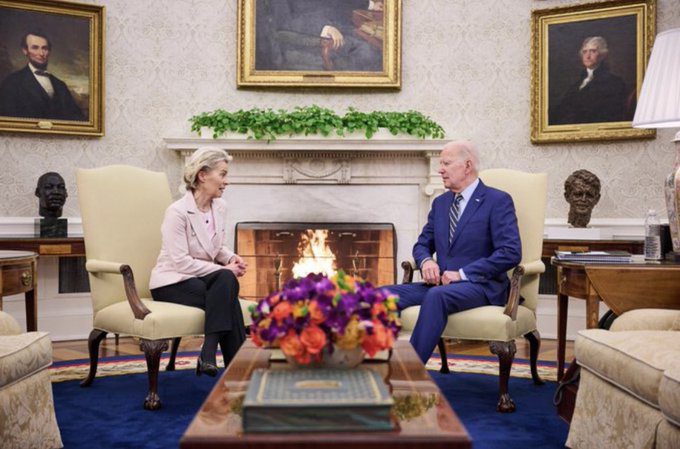
European Commission President Ursula von der Leyen with U.S. President Joe Biden at the White House.
EU Delegation UK / Twitter
EU Commission President Ursula von der Leyen could be moving offices—according to The Telegraph, which revealed that she is the Biden administration’s top pick to become the next NATO secretary general, a job change that would have major implications in the calculus of next year’s European elections. The rumour, though, has been sharply denied by White House sources. That has not stopped speculation that von der Leyen is the preferred candidate due to the criteria she meets as both a German, a woman, and someone amenable to the French.
A strong relationship between the American president and von der Leyen, built throughout the Ukraine crisis, and a willingness to trust American over European intelligence, has made von der Leyen the primary contender to replace Jens Stoltenberg when he leaves office in October 2024. While so far denying the possibility of von der Leyen taking the job, the rumour has angered many in the pro-Brexit British press seeing it as a snub due to von der Leyan’s role in Brexit negotiations.
The office of NATO secretary general is traditionally held by a European in four-year rotations and is reserved for candidates with impeccable Atlanticist credentials. NATO will hold its annual meeting in Lithuania next week amid a reported impasse regarding the leadership of the military alliance after 2024. Stoltenberg was recently given a one-year extension to oversee the expected end of the war in Ukraine and potentially enable von der Leyen to complete her term as Commission president.
While the Biden administration might like to parachute von der Leyen into the NATO hot seat, it is uncertain whether she would accept due to a wish to stay on for another term as Commission president. It is understood that von der Leyen would have the support of French President Macron for the NATO top spot due to her relative francophilia. German social democratic Chancellor Olaf Scholz and former political rival would also support her if only to see her out of the Commission.
The 64-year-old von der Leyen had a controversial stint as German Defence Minister between 2014 and 2019 in a tenure that was noted for a sharp decline in German military preparedness. Her time as Commission president has seen a complete geopolitical alignment between Washington and Brussels over Ukraine, with many Atlanticist pundits describing her as a safe pair of hands for the NATO role.
Her departure would herald a major shift in her EPP political faction, which is currently wrestling over its future relationship with right-wing populist parties that will wield political power across Europe. Von der Leyen and most northern Christian Democrat members of the EPP are said to be antagonistic to alliances with populists and have been at odds with current EPP President Manfred Weber. Speculation is mounting that the EPP could be forced into an alliance with more right-wing factions in the European Parliament after next year’s EU elections.
NATO has undergone a revival on the world stage since the invasion of Ukraine, although it struggles with internal squabbles over Turkish and Hungarian objections to Sweden’s membership. This situation has been exacerbated by a planned Quran burning in Sweden and Turkey’s fears that Stockholm harbours Kurdish separatists. Biden will be hosting the Swedish PM Ulf Kristersson in the White House Wednesday, July 5th, in the hopes of finally putting the issue to bed despite no sign of movement from Ankara on the Swedish application.
Prior to this week, UK Defence Secretary Ben Wallace was the odds-on favourite for the NATO role but was apparently blocked by the pro-Irish Biden due to his role as a British soldier in Northern Ireland. The French apparently were also unfavourable to Wallace, seeing him as an overtly anglophile candidate.
Similarly, Danish PM Mette Frederiksen ruled herself out due to potential objections from Turkey over Denmark’s role in recent Quran burnings, and the fact she would be the third Scandinavian in a row to hold NATO’s top job.
